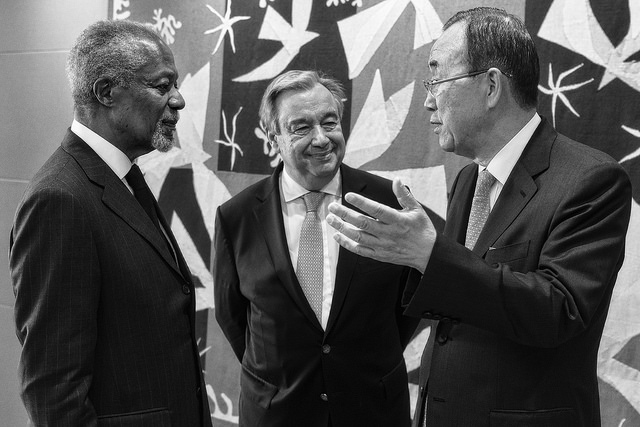Updated
UNGA Fifteen Years Ago, and Today – Ambassador Edward M. Gabriel (ret.)

Secretary-General António Guterres Meets with Former Secretaries-General Kofi Annan and Ban Ki-moon, UN Photo/Mark Garten
Ambassador Edward M. Gabriel (ret.)
October 10, 2018
 The annual meeting of the United Nations General Assembly (UNGA) in New York last week calls to mind one held 15 years ago when President George W. Bush became personally involved in the question of the Western Sahara. Since the US first proposed a compromise political solution in 1999, in which it suggested an internationally accepted form of autonomy for the people of the Sahara under Moroccan sovereignty, Morocco has found itself having to remind the US of its own policy at two critical moments. September 2003 was one such time.
The annual meeting of the United Nations General Assembly (UNGA) in New York last week calls to mind one held 15 years ago when President George W. Bush became personally involved in the question of the Western Sahara. Since the US first proposed a compromise political solution in 1999, in which it suggested an internationally accepted form of autonomy for the people of the Sahara under Moroccan sovereignty, Morocco has found itself having to remind the US of its own policy at two critical moments. September 2003 was one such time.
In 1999, the year of the enthronement of King Mohammed VI, the US and Morocco came to terms on a new approach to the Sahara question, favoring a compromise solution of autonomy/sovereignty, instead of a winner-take-all referendum. It was a courageous decision by the new King, as it overturned nearly two decades of King Hassan II’s policy supporting a referendum. It was also a clear sign from the Clinton Administration in support of Morocco on this issue.
All appeared to be progressing until the summer of 2003, when, frustrated by a lack of support for a political compromise by Algeria and the Polisario Front, UN Personal Envoy James Baker introduced his second autonomy proposal, which represented a reversal of the previous agreements between Morocco and himself, as well as the US. It was also clearly biased, favoring the Algeria-backed Polisario Front in order to advance its interests. Morocco was left with no choice but to refuse it.
This led King Mohammed to have a little publicized meeting with President Bush at the UNGA in New York on September 23, 2003 during which the President clarified the US position as distinct from James Baker’s attempt to force through a non-viable solution of his own. At that meeting, the King was given strong assurances by President Bush that the United States would not impose a solution unacceptable to Morocco, or support any such action in the UN Security Council.
That meeting was the beginning of a process during which Morocco developed and then proposed its own initiative within a framework of autonomy/sovereignty, first by attempting to find a compromise with Baker, and then finally, with US support, by proposing its own initiative to the UN Security Council in April 2007.
That meeting also led to a warm and fruitful bilateral relationship between the US and Morocco for the remainder of the Bush Administration. Indeed, in June 2008, Dana Perino, White House spokesperson, stated that, “the President sent a letter to King Mohammed. It reiterated the U.S. position, first announced in the UN Security Council, that autonomy under Moroccan sovereignty is the only feasible solution for the Western Sahara dispute and our support for substantive negotiations on this matter within the U.N.‐led framework.”
Today, fifteen years later, the UN Security Council is poised to reinvigorate the UN mission through its new Secretary General, Antonio Guterres, and his newly appointed Personal Envoy, Horst Kohler. Mr. Kohler seems determined to restart the negotiations after several years of no progress, and in an encouraging sign, invited Algeria to attend. But will Algeria, which exerts virtually absolute control over the Polisario, agree to become a direct Party to the negotiations? This remains an open question and a sine qua non for Morocco.
Everything seems to be in support of Morocco’s interest for a UN-led effort, although with the announcement this week of the retirement of the USUN Ambassador, Nicky Haley, who enjoyed the respect of and had influence with the Trump Administration, a question arises as to who will control the US position on the Sahara issue moving forward. The time may still be ripe, however, for the UN Personal Envoy to lead the Security Council into a final push that turns a political compromise between the Parties into a fait accompli, while Ambassador Haley is still in office. Otherwise, Morocco could face a White House National Security Council, in the future, that will not be as supportive of its interests.